NewsBrief, 7-13 July 2015
- International partners pledge USD 3.4 billion for Ebola recovery
- Burkina Faso: ECOWAS Court rejects electoral ban on Compaoré allies
- ECOWAS officials approve a mid-term Strategic Framework
- Mali signs agreement to build West Africa's largest solar plant
- Who's Who? Tony Elumelu, businessman and philanthropist
- Publication: A Survey on Migration Policies in West Africa
International partners pledge USD 3.4 billion for Ebola recovery
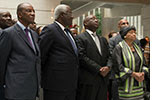 The international community has shown solidarity with the three countries hit hardest by the Ebola outbreak in West Africa. Partners pledged USD 3.4 billion to help Guinea, Liberia and Sierra Leone get back on their feet at the International Ebola Recovery Conference, held from 9 to 10 July at the UN headquarters in New York. The conference was convened by UN Secretary-General Ban Ki-moon and attended by the leaders of the three West African countries as well as the secretary-general of the Mano River Union. "Humanity sometimes displays a short attention span and wants to move to other issues because the threat of Ebola seems over," Sierra Leone's President Ernest Bai Koroma said. "The threat is never over until we rebuild the health sector Ebola demolished, until we rebuild the livelihoods in agriculture it compromised, until we shore up government revenues it dried up, and until we breathe life into the private sector it has suffocated." Liberian President Ellen Johnson Sirleaf also urged continued vigilance against the virus, which has killed more than 11,000 people and reversed years of development gains in the three countries. The "world has a great stake in how we respond to the global threat" of the Ebola epidemic," Sirleaf said. "We can and we must return to the progress of our pre-Ebola trauma." Development partners responded, with the EU kicking off the pledging with a commitment of USD 500 million to support health care, agriculture and other affected sectors. The amount pledged exceeds the USD 3.2 billion the three countries had requested to support their national Ebola recovery plans over the next two years. A separate regional recovery plan, however, aims to raise an additional USD 4 billion. Including previous commitments, international partners have pledged a total of approximately USD 5 billion in support for post-Ebola recovery. While transmission rates have fallen drastically since the peak of the outbreak, the World Health Organization continues to report approximately 30 new cases each week.
The international community has shown solidarity with the three countries hit hardest by the Ebola outbreak in West Africa. Partners pledged USD 3.4 billion to help Guinea, Liberia and Sierra Leone get back on their feet at the International Ebola Recovery Conference, held from 9 to 10 July at the UN headquarters in New York. The conference was convened by UN Secretary-General Ban Ki-moon and attended by the leaders of the three West African countries as well as the secretary-general of the Mano River Union. "Humanity sometimes displays a short attention span and wants to move to other issues because the threat of Ebola seems over," Sierra Leone's President Ernest Bai Koroma said. "The threat is never over until we rebuild the health sector Ebola demolished, until we rebuild the livelihoods in agriculture it compromised, until we shore up government revenues it dried up, and until we breathe life into the private sector it has suffocated." Liberian President Ellen Johnson Sirleaf also urged continued vigilance against the virus, which has killed more than 11,000 people and reversed years of development gains in the three countries. The "world has a great stake in how we respond to the global threat" of the Ebola epidemic," Sirleaf said. "We can and we must return to the progress of our pre-Ebola trauma." Development partners responded, with the EU kicking off the pledging with a commitment of USD 500 million to support health care, agriculture and other affected sectors. The amount pledged exceeds the USD 3.2 billion the three countries had requested to support their national Ebola recovery plans over the next two years. A separate regional recovery plan, however, aims to raise an additional USD 4 billion. Including previous commitments, international partners have pledged a total of approximately USD 5 billion in support for post-Ebola recovery. While transmission rates have fallen drastically since the peak of the outbreak, the World Health Organization continues to report approximately 30 new cases each week.
Article in English: http://reliefweb.int/five-billion-dollars-help-recovery-ebola
Article in French: http://reliefweb.int/34-milliards-de-dollars-pour-aider-les
Burkina Faso: ECOWAS Court rejects electoral ban on Compaoré allies
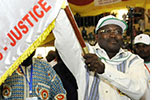 The ECOWAS Court of Justice has ruled that Burkina Faso may not exclude supporters of former President Blaise Compaoré from contesting upcoming elections. Compaoré, who ruled the country for 27 years, was forced out last October by a popular uprising against a plan to amend the Constitution so that Compaoré could seek another term in office. Burkina Faso is set to conclude its political transition and restore democracy through elections scheduled for October. In April the interim parliament passed electoral reforms that barred any candidate who had supported Compaoré constitutional amendment. Seven political parties, including the former ruling party, and 13 individuals brought the case to the court. In a ruling issued on 13 July, the regional court ordered Burkina Faso to remove any obstacles to free participation in the elections. "The court ruled that the amendment that excludes them is a violation of their fundamental human rights, in line with the international obligations of Burkina Faso," court spokesman Sunny Ugoh said. Ugoh told reporters that the court's decisions are binding on member states and are not subject to appeal.
The ECOWAS Court of Justice has ruled that Burkina Faso may not exclude supporters of former President Blaise Compaoré from contesting upcoming elections. Compaoré, who ruled the country for 27 years, was forced out last October by a popular uprising against a plan to amend the Constitution so that Compaoré could seek another term in office. Burkina Faso is set to conclude its political transition and restore democracy through elections scheduled for October. In April the interim parliament passed electoral reforms that barred any candidate who had supported Compaoré constitutional amendment. Seven political parties, including the former ruling party, and 13 individuals brought the case to the court. In a ruling issued on 13 July, the regional court ordered Burkina Faso to remove any obstacles to free participation in the elections. "The court ruled that the amendment that excludes them is a violation of their fundamental human rights, in line with the international obligations of Burkina Faso," court spokesman Sunny Ugoh said. Ugoh told reporters that the court's decisions are binding on member states and are not subject to appeal.
Article in English: http://af.reuters.com/idAFL5N0ZT45P20150713
Article in French: http://www.afrik.com/ecompaore-cedeao-burkina-faso
ECOWAS officials approve a mid-term Strategic Framework
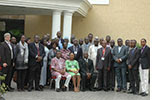 Officials from 15 ECOWAS institutions and agencies have approved a five-year framework for the implementation of Community programmes aimed at strengthening integration. The 10th meeting of the ECOWAS Strategic Planning Co-ordinating Committee (SPCC) was held from 9-11 July in Lagos. The purpose of the meeting was to finalise and adopt the Community Strategic Framework (CSF) 2016-2020 as well as the Strategic Action Programmes (SAP) of ECOWAS Institutions and Agencies. The CSF provides a foundation for mid-term action to build a borderless, peaceful and prosperous region. "The CSF goal areas include deepening the process of socio-economic development in member states, forging and consolidating production, trade and monetary integration within the Community, deepening the process of political cohesion and participation, consolidating, mobilising and sustaining societal and industrial support as well as expanding and improving infrastructural facilities within the region," the ECOWAS Commission said in a statement. During the meeting, members of the SPCC reviewed the draft CSF and discussed its five goal areas and related strategic objectives, themes and expected outcomes. They offered recommendations for the effective implementation of the plan and prepared tools to ensure that Community programmes are in line with stated goals. In his closing remarks, ECOWAS Commission Vice President Toga McIntosh commended SPCC members for the high degree of commitment displayed during the consultations.
Officials from 15 ECOWAS institutions and agencies have approved a five-year framework for the implementation of Community programmes aimed at strengthening integration. The 10th meeting of the ECOWAS Strategic Planning Co-ordinating Committee (SPCC) was held from 9-11 July in Lagos. The purpose of the meeting was to finalise and adopt the Community Strategic Framework (CSF) 2016-2020 as well as the Strategic Action Programmes (SAP) of ECOWAS Institutions and Agencies. The CSF provides a foundation for mid-term action to build a borderless, peaceful and prosperous region. "The CSF goal areas include deepening the process of socio-economic development in member states, forging and consolidating production, trade and monetary integration within the Community, deepening the process of political cohesion and participation, consolidating, mobilising and sustaining societal and industrial support as well as expanding and improving infrastructural facilities within the region," the ECOWAS Commission said in a statement. During the meeting, members of the SPCC reviewed the draft CSF and discussed its five goal areas and related strategic objectives, themes and expected outcomes. They offered recommendations for the effective implementation of the plan and prepared tools to ensure that Community programmes are in line with stated goals. In his closing remarks, ECOWAS Commission Vice President Toga McIntosh commended SPCC members for the high degree of commitment displayed during the consultations.
Article in English: http://www.ecowas.int/strategic-action-programme-of-e/
Mali signs agreement to build West Africa's largest solar plant
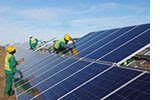 Mali has signed an agreement with a Norwegian renewable energy company to build the first industrial-scale solar power plant in West Africa. Scatec Solar will develop and construct the USD 55 million solar plant in partnership with local developer Africa Power 1. The 33-megawatt facility will be located in Segou in southwest Mali, about 240 km northwest of Bamako. Speaking at the 9 July signing ceremony, Minister of Finance Mamadou Igor Diarra said the agreement represents Mali's ambitions to turn the page after tumultuous period and take steps to meet the energy needs of its people and its economy. "Although Mali has recently experienced some significant challenges, we still have very ambitious plans to attract investors. This project represents an important milestone in developing the energy sector to help strengthen our economy," Diarra said. The Scatec Segou solar plant is expected to produce enough electricity to supply 60,000 homes while reducing carbon dioxide emissions by 46 000 tonnes per year. "This is an historical event for Mali, which is on its way to installing the largest solar grid-connected power plant in West Africa. The participation of Malians in this high profile joint-venture will serve as a model that opens the solar era in West Africa," Africa Power 1 chairman Ibrahim Togola said. Oslo-based Scatec will own 50% of the Segou plant, with the World Bank's International Finance Corporation taking a 32.5% interest and local partner Africa Power 1 owning a 17.5% share.
Mali has signed an agreement with a Norwegian renewable energy company to build the first industrial-scale solar power plant in West Africa. Scatec Solar will develop and construct the USD 55 million solar plant in partnership with local developer Africa Power 1. The 33-megawatt facility will be located in Segou in southwest Mali, about 240 km northwest of Bamako. Speaking at the 9 July signing ceremony, Minister of Finance Mamadou Igor Diarra said the agreement represents Mali's ambitions to turn the page after tumultuous period and take steps to meet the energy needs of its people and its economy. "Although Mali has recently experienced some significant challenges, we still have very ambitious plans to attract investors. This project represents an important milestone in developing the energy sector to help strengthen our economy," Diarra said. The Scatec Segou solar plant is expected to produce enough electricity to supply 60,000 homes while reducing carbon dioxide emissions by 46 000 tonnes per year. "This is an historical event for Mali, which is on its way to installing the largest solar grid-connected power plant in West Africa. The participation of Malians in this high profile joint-venture will serve as a model that opens the solar era in West Africa," Africa Power 1 chairman Ibrahim Togola said. Oslo-based Scatec will own 50% of the Segou plant, with the World Bank's International Finance Corporation taking a 32.5% interest and local partner Africa Power 1 owning a 17.5% share.
Article in English: http://ifcext.ifc.org/1C485257E7D006A69AE
Article in English: http://phys.org/news/2015-07-mali-west-africa-solar.html
Article in French: http://www.jeuneafrique.com/solaire-en-afrique-de-louest/
Who's Who? Tony Elumelu, businessman and philanthropist
Tony Elumelu is part of a growing trend of African business leaders using their financial capital to develop the continent's human capital. The Nigerian economist and entrepreneur has pledged to transform the continent by empowering the next generation of business leaders. Born in 1963 in Jos in central Plateau State, Elumelu earned his master's in economics from the University of Lagos and is a graduate of the Advanced Management Programme at Harvard Business School. He made waves in the corporate world in 2005 when he pulled off the largest banking sector merger in sub-Saharan Africa, combining Standard Trust Bank with United Bank for Africa (UBA). In 2010 he established the Tony Elumelu Foundation, an African-funded philanthropic organisation that aims to support entrepreneurship and enhance private sector competitiveness in Africa. This month the Foundation welcomed 1 000 young entrepreneurs from 51 African countries to a two-day business bootcamp as part of the Tony Elumelu Entrepreneurship Programme (TEEP). "Entrepreneurship is not a short-term journey and I am pleased that we can help these emerging leaders, as they seek to join me in transforming Africa," Elumelu said. "My commitment towards creating 1 000 new entrepreneurs who can change Africa forever has now become a reality. This is only the beginning." In addition to the bootcamp experience, participants receive 12 weeks of training, on-going support and USD 10 000 in seed capital. Another key component for Elumelu is to build strong professional networks among the future business leaders that could ultimately result in increased intra-African trade.
Article in English: http://www.africanreview.com/philanthropist-tony-elumelu
Article in English: http://naija247news.com/emerging-african-entrepreneurs/
Article in French: http://www.lemonde.fr/elumelu-l-africapitalisme-3212.html#
Article in French: http://www.agenceecofin.com/1000-entrepreneurs-tony-emulelu
Publication: A Survey on Migration Policies in West Africa
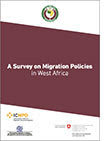 More than three decades after the adoption of the Protocol relating to the Free Movement of Persons, the Right of Residence and Establishment, ECOWAS citizens have yet to fully realise the right of unfettered mobility across the region. While all countries now allow visa-free entry for a period of less than 90 days, few have taken the next step to allow residency and employment access for migrants from other member countries. This paper analyses current policies, practices and trends in migration across the 15 ECOWAS member states. The aim is to contribute to a clearer picture of the current reality for West African migrants and point out where coherent policies and frameworks are lacking. The study was commissioned by ECOWAS and the Swiss Agency for Development and Co-operation and prepared by the International Organization for Migration and the International Centre for Migration Policy Development.
More than three decades after the adoption of the Protocol relating to the Free Movement of Persons, the Right of Residence and Establishment, ECOWAS citizens have yet to fully realise the right of unfettered mobility across the region. While all countries now allow visa-free entry for a period of less than 90 days, few have taken the next step to allow residency and employment access for migrants from other member countries. This paper analyses current policies, practices and trends in migration across the 15 ECOWAS member states. The aim is to contribute to a clearer picture of the current reality for West African migrants and point out where coherent policies and frameworks are lacking. The study was commissioned by ECOWAS and the Swiss Agency for Development and Co-operation and prepared by the International Organization for Migration and the International Centre for Migration Policy Development.
Report in English: http://www.icmpd.org/Migration_West_Africa_EN_SOFT.pdf
Report in French: http://www.icmpd.org/Migration_West_Africa_FR_SOFT.pdf
